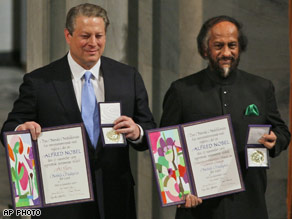
Al Gore, left, and Rajendra Pachauri hold their awards at the Nobel Peace Prize ceremony Monday December 10th 2007.

In accepting the prize he shared with the U.N. climate panel, the former vice president said humanity risks sliding down a path of "mutually assured destruction."
"It is time to make peace with the planet," Gore said in his acceptance speech that evoked Churchill, Gandhi and the Bible. "We must quickly mobilize our civilization with the urgency and resolve that has previously been seen only when nations mobilized for war."
Gore shared the Nobel with the Intergovernmental Panel on Climate Change, for
sounding the alarm over global warming and spreading awareness on how to
counteract it. The U.N. panel was represented at the ceremony by its leader,
Rajendra Pachauri. ![]() A
look at the last dozen Peace Prize winners »
A
look at the last dozen Peace Prize winners »
"We, the human species, are confronting a planetary emergency -- a threat to the survival of our civilization that is gathering ominous and destructive potential even as we gather here," Gore said at the gala ceremony in Oslo's City Hall, in front of Norway's royalty, leaders and invited guests.
Gore urged China and the U.S. -- the world's biggest carbon emitters -- to "make the boldest moves, or stand accountable before history for their failure to act."
His remarks came as governments met in Bali, Indonesia, to start work on a new international treaty to reduce climate-damaging carbon dioxide emissions. Gore and Pachauri plan to fly there Wednesday to join the climate talks.

The governments hope to have the new pact, which succeeds the Kyoto accord, in place by 2012, but Gore has said the urgency of the problem means they should aim to come to an agreement by 2010. Before his speech, Gore said that he believes the next U.S. president will shift the country's course on climate change and engage in global efforts to reduce carbon emissions. "The new president, whichever party wins the election, is likely to have to change the position on this climate crisis," Gore said in the interview. "I do believe the U.S., soon, is to have a more constructive role." He said it was not too late for the Bush administration to join efforts to draft a new global treaty limiting greenhouse gas emissions. "I have urged President Bush and his administration to be part of the world community's effort to solve this crisis," Gore said. "I hope they will change their position." The Bush administration opposed the Kyoto treaty on climate change, saying it would hurt the U.S. economy and objecting that fast developing nations like China and India were not required to reduce emissions.
In his speech, Gore urged nations to impose a CO2 tax, and called for a moratorium on the building of new coal plants without the capacity to trap carbon. He directed special attention to the United States and China, the world's biggest emitters of carbon emissions. "While India is also growing fast in importance, it should be absolutely clear that it is the two largest CO2 emitters - and most of all, my own country - that will need to make the boldest moves, or stand accountable before history for their failure to act," Gore said.
"Both countries should stop using the other's behavior as an excuse for stalemate and instead develop an agenda for mutual survival in a shared global environment."
Pachauri described in his speech how a warming climate could lead to flooding of low-lying countries, disruptions to food supply, the spread of diseases and the loss of biodiversity. The impact "could prove extremely unsettling" for the world's poor and vulnerable, he said, and ended his speech with a question for the Bali conference: "Will those responsible for decisions in the field of climate change at the global level listen to the voice of science and knowledge, which is now loud and clear?"
It may be recalled that in sept 2006, in Stockholm Global an International seminar took place September 11-12th 2006, at the Royal Institute of Technology (KTH), Stockholm, Sweden on "Scientific Controversies in Climate Variability".
Mis en ligne le 17/12/2007 par Pierre Ratcliffe. Contact: (pratclif@free.fr) sites web http://paysdefayence.blogspot.com et http://pierreratcliffe.blogspot.com